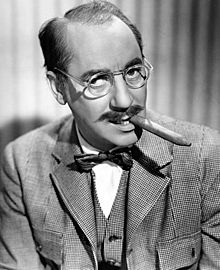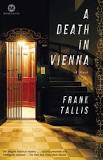
Back to basics. The idea of Funny Freud Friday stemmed in large part from my quest to determine whether Freud was the type of person who would have schmoozed with his butcher, my great uncle. Today I present more evidence that he was from Frank Tallis, a clinical psychologist and the author of a terrific series of mysteries set in early 20th-century Vienna that feature Max Liebermann, a psychology student and Freud devotee.
Freud: A Frustrated Stand-Up
 Tallis, who researched the era “down to the type of ashtray” Freud would have had on his table, said in an interview with the Jewish Chronicle that the father of psychoanalysis was a frustrated stand-up comedian:
Tallis, who researched the era “down to the type of ashtray” Freud would have had on his table, said in an interview with the Jewish Chronicle that the father of psychoanalysis was a frustrated stand-up comedian:
He loved Jewish jokes and even wrote a book about them. I’ve tried to use some of his jokes in the novels, although I’ve had to bring some of them up to date. I always think that the person Freud was most like was Groucho Marx — they both loved jokes and, of course, cigars.
Tallis opens the first of his Leibermann mysteries, A Death in Vienna, with a scene featuring Max and his father, Mendel, in a cafe. The two are having a discussion they have often had before, about whether Max will go into his father’s textile business. Max is distracted by the entry of an immaculately dressed man with a neatly trimmed mustache and beard. The man receives a warm welcome from the head waiter, who helps him takes his coat off.
Then, Tallis writes, “He must have made a quip, because the head waiter suddenly began laughing. The man seemed in no hurry to find a seat and stood by the door, listening intently to the waiter, who now appeared—Liebermann thought—to have started to tell a story.” The man turns out to be Sigmund Freud, recognized by both father and son, though the former is far less enthusiastic about the professor than the latter.
Back to the B’nai B’rith
Max wonders how Mendel knows that Freud has recently become a professor, and Mendel answers, “He comes to the lodge.” To Mendel’s annoyance, Max asks, “What lodge?” Mendel answers, scowling, “B’nai B’rith.”
Two things interest me about this scene.
First, it clearly represents Freud as a schmoozer. You’ve got to figure that any man who stands around joking with a cafe headwaiter is also going to exchange more than a few words with the man who, for 44 years, had a butcher shop in the same building where Freud lived and worked.
But something else is even more intriguing. Tallis assumes that Max’s father, the owner of a textile factory, would have been accepted as a member of the Vienna lodge of B’nai B’rith — the same assumption I’d made about my great uncle, who was prosperous enough to own three butcher shops. But as I discussed in Five Genealogy Lessons I Learned from B’nai B’rith (Once I Stopped Sulking) — a post that, by coincidence, compares Freud with Groucho Marx — a businessmen would not have necessarily been admitted to the fraternal organization. The B’nai B’rith researcher I contacted said it was unlikely that Siegmund Kornmehl would have met Sigmund Freud at B’nai B’rith because:
The members of all the Austrian lodges, from their inception, when Austria was part of the Austro-Hungarian Empire, were members of an elite and educated class. Mostly physicians, members included lawyers, architects, writers and playwrights, lawyers, academics, and even a few artists and interior designers. All European lodges had these standards for membership.
So medical student Max would have been more likely to belong to the Vienna B’nai B’rith lodge than would his business owner father Mendel.
But of course Mendel is fictional. And maybe he has a back story that would have qualified him for membership. Dr. Tallis?

Leave a Reply